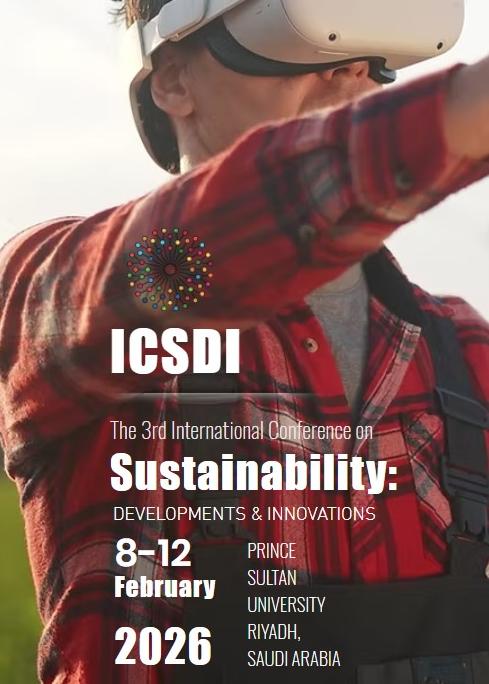45th PARIS International Congress on “Advances in Chemical, Biological & Environmental Sciences” (ACBES-25) scheduled on Dec. 3-5, 2025 Paris (France)
ACBES-25
- URL: https://earbm.org/conference/299
- Event Date: 2025-12-03 ~ 2025-12-05
- Submission Date: 2025-11-13
- Organizer: EARBM
- Location: Paris, France
Medicinal Chemistry Organic Chemistry Chemical & Material Sciences (General) Chemical Kinetics & Catalysis Cell Biology Developmental Biology & Embryology Evolutionary Biology Microbiology Molecular Biology Bioinformatics & Computational Biology
Call for papers/Topics
Topics of interest for submission include any topics related to:
I. Chemical Sciences
- Sustainable Chemistry & Green Chemistry:
- Green synthesis and catalysis (biocatalysis, organocatalysis, photochemistry)
- Renewable resources and bio-based chemicals
- Waste reduction and valorization
- Circular economy principles in chemistry
- Design of environmentally benign processes and products
- Materials Science:
- Nanomaterials (synthesis, characterization, applications)
- Advanced materials (polymers, composites, ceramics)
- Biomaterials and their applications in medicine and engineering
- Energy materials (batteries, fuel cells, solar cells)
- Smart and responsive materials
- Supramolecular chemistry and self-assembly
- Metal-Organic Frameworks (MOFs) and Covalent-Organic Frameworks (COFs)
- Analytical Chemistry:
- New analytical techniques and instrumentation
- Sensors and biosensors
- Spectroscopy (NMR, MS, UV-Vis, IR, etc.)
- Chromatography and separation science
- Electroanalytical chemistry
- Chemometrics and data analysis in chemical studies
- Organic Chemistry:
- Synthesis of complex organic molecules and natural products
- Medicinal chemistry and drug discovery
- Flow chemistry and continuous processes
- Asymmetric synthesis
- Computational organic chemistry
- Inorganic Chemistry:
- Inorganic synthesis and characterization
- Coordination chemistry and organometallic chemistry
- Solid-state chemistry
- Inorganic materials for catalysis and energy
- Physical Chemistry:
- Thermodynamics and kinetics
- Quantum chemistry and computational chemistry
- Electrochemistry
- Surface chemistry and catalysis
- Spectroscopy and photochemistry
- Chemical Engineering:
- Process design, optimization, and intensification
- Reaction engineering and reactor design
- Separation processes
- Biochemical engineering (bioreactors, bioseparations)
- Safety and risk management in chemical processes
- Digitalization and AI in chemical industries
II. Biological Sciences
- Biotechnology & Genetic Engineering:
- CRISPR-Cas9 and other gene editing technologies
- Synthetic biology and the design of new biological systems
- Biopharmaceuticals and advanced drug delivery systems
- Metabolic engineering for biofuel and biochemical production
- Bioinformatics and computational biology
- Biochemistry & Molecular Biology:
- Enzymology and protein engineering
- Nucleic acids (DNA replication, transcription, translation, epigenetics)
- Cell signaling and cellular processes
- Structural biology and its applications in drug design
- Genomics, proteomics, and metabolomics
- Neuroscience and the study of the nervous system
- Microbiology:
- Microbial ecology and its role in nutrient cycling and environmental processes
- Bioremediation of contaminated environments
- Microbial fuel cells and other bioenergy technologies
- Detection and control of waterborne and airborne pathogens
- Infectious diseases and antimicrobial resistance
- Ecology & Biodiversity:
- Climate change impacts on ecosystems and species
- Conservation biology and strategies for biodiversity preservation
- Ecosystem services and their economic valuation
- Invasive species and their management
- Ecological modeling and big data in ecology
- Restoration ecology and rewilding
- Plant Science:
- Plant biotechnology for crop improvement and stress tolerance
- Plant physiology and responses to environmental changes
- Sustainable agriculture and plant-microbe interactions
- Plant pathology and disease resistance
- Animal Biology:
- Animal physiology, genetics, and behavior
- Animal ecology and conservation
- Developmental biology
- Biomedicine & Health:
- Drug discovery and development
- Biomarkers and diagnostics
- Gene therapy and cell therapy
- Immunology and disease mechanisms
- Personalized medicine
III. Environmental Sciences
- Pollution Control & Remediation:
- Water and wastewater treatment technologies
- Air pollution monitoring and control
- Soil contamination and remediation strategies
- Waste management and recycling technologies
- Emerging pollutants (microplastics, pharmaceuticals, PFAS) and their environmental fate and effects
- Bioremediation and phytoremediation
- Climate Change & Its Impacts:
- Climate modeling and prediction
- Mitigation strategies (reducing greenhouse gas emissions, carbon capture and utilization)
- Adaptation strategies for dealing with climate change impacts
- Carbon sequestration and storage
- Climate policy and governance
- Water Resources Management:
- Water scarcity and drought management
- Water quality assessment and management
- Hydrology and the impact of land use change on water resources
- Integrated water resources management
- Desalination technologies
- Environmental Health:
- Impact of environmental pollutants on human health
- Exposure assessment and risk management
- Environmental justice and health disparities
- Ecology & Ecosystem Management (Environmental Perspective):
- Ecosystem restoration and rehabilitation
- Conservation of natural habitats and protected areas
- Sustainable forestry and land management
- Urban ecology and green infrastructure
- Environmental Chemistry & Geochemistry:
- Biogeochemical cycles and their anthropogenic impacts
- Atmospheric chemistry and aerosols
- Soil chemistry and nutrient cycling
- Fate and transport of contaminants in the environment
- Renewable Energy:
- Solar energy (photovoltaics, concentrated solar power)
- Wind energy
- Bioenergy and biofuels
- Geothermal energy
- Hydrogen energy and fuel cells
IV. Interdisciplinary Topics & Cross-Cutting Themes
- Chemical Biology: Bridging chemistry and biology to understand biological processes and develop chemical tools and therapies.
- Environmental Biotechnology: Using biological systems and processes for environmental remediation, monitoring, and sustainable production.
- One Health Approach: Recognizing the interconnectedness of human, animal, and environmental health.
- Data Science & AI/Machine Learning: Applications in drug discovery, materials design, environmental monitoring, climate modeling, and biological data analysis.
- Nanotechnology in C/B/E Sciences: Applications in medicine, environmental remediation, sensing, and materials.
- Sustainable Development Goals (SDGs): Research addressing global challenges related to the environment, health, and sustainable practices.
- Environmental Impact Assessment (EIA) & Life Cycle Assessment (LCA): Evaluating the environmental consequences of projects and products.
- Citizen Science & Public Engagement: Involving the public in scientific research and environmental monitoring.
- Policy & Governance: The role of science in informing environmental and health policies.














